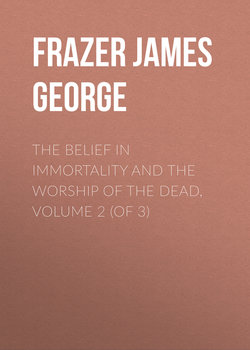Читать книгу The Belief in Immortality and the Worship of the Dead, Volume 2 (of 3) - Frazer James George - Страница 13
CHAPTER II
THE BELIEF IN IMMORTALITY AMONG THE TONGANS
§ 6. Priests and their Inspiration
ОглавлениеPriests were known by the title of fahe-gehe, a term which means "split off," "separate," or "distinct from," and was applied to a man who has a peculiar sort of mind or soul, different from that of ordinary men, which disposed some god occasionally to inspire him. Such inspirations frequently happened, and when the fit was on him the priest had the same reverence shown to him as if he were the god himself; at these times even the king would retire to a respectful distance and sit down among the rest of the spectators, because a god was believed to exist at that moment in the priest and to speak from his mouth. But at other times a priest had no other respect paid to him than was due to him for his private rank in society. Priests generally belonged to the lower order of chiefs or to their ministers, the matabooles; but sometimes great chiefs were thus visited by the gods, and the king himself has been inspired by Tali-y-Toobo, the chief of the gods.200 The profession of priest was generally hereditary, the eldest son of a priest becoming, on his father's death, a priest of the same god who had inspired his deceased parent. In their uninspired moments the priests lived indiscriminately with the rest of the people and were treated with no special deference.201
The ceremony of inspiration, during which the priest was believed to be possessed by a god and to speak in his name, was regularly accompanied or preceded by a feast, at which the drinking of kava formed the principal feature. The priest himself presided at the feast and the people gathered in a circle round him; or, to be more exact, the people formed an ellipse, of which the priest occupied the place of honour at one of the narrow ends; while opposite him, at the other extremity of the ellipse, sat the man who was charged with the important duty of brewing the kava. At such sessions the chiefs sat indiscriminately among the people on account of the sacredness of the occasion, conceiving that such humble demeanour must be acceptable to the gods. The actual process of inspiration was often witnessed by Mariner, and is described by him in his own words as follows:
"As soon as they are all seated, the priest is considered as inspired, the god being supposed to exist within him from that moment. He remains for a considerable time in silence, with his hands clasped before him; his eyes are cast down, and he rests perfectly still. During the time that the victuals are being shared out, and the cava preparing, the matabooles sometimes begin to consult him; sometimes he answers them, at other times not; in either case he remains with his eyes cast down. Frequently he will not utter a word till the repast is finished, and the cava too. When he speaks, he generally begins in a low and very altered tone of voice, which gradually rises to nearly its natural pitch, though sometimes a little above it. All that he says is supposed to be the declaration of the god, and he accordingly speaks in the first person as if he were the god. All this is done generally without any apparent inward emotion or outward agitation; but on some occasions his countenance becomes fierce, and, as it were, inflamed, and his whole frame agitated with inward feeling; he is seized with an universal trembling; the perspiration breaks out on his forehead, and his lips, turning black, are convulsed; at length, tears start in floods from his eyes, his breast heaves with great emotion, and his utterance is choked. These symptoms gradually subside. Before this paroxysm comes on, and after it is over, he often eats as much as four hungry men, under other circumstances, could devour. The fit being now gone off, he remains for some time calm, and then takes up a club that is placed by him for the purpose, turns it over and regards it attentively; he then looks up earnestly, now to the right, now to the left, and now again at the club; afterwards he looks up again, and about him in like manner, and then again fixes his eyes upon his club, and so on, for several times: at length he suddenly raises the club, and, after a moment's pause, strikes the ground, or the adjacent part of the house, with considerable force: immediately the god leaves him, and he rises up and retires to the back of the ring among the people."202
200
W. Mariner, Tonga Islands, ii. 80 sq.
201
W. Mariner, op. cit. ii. 136-138.
202
W. Mariner, Tonga Islands, i. 99-101. Compare E. E. V. Collocot, "Notes on Tongan Religion," Journal of the Polynesian Society, xxx. (1921) pp. 155-157.
